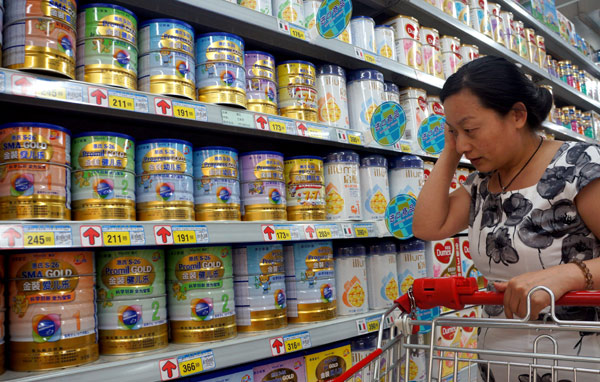Milk powder prices lowered after govt probe
|
 A woman looks at imported milk powder at a supermarket in Zhengzhou, Henan province. Provided to China Daily |
An increasing number of foreign and domestic milk powder companies have cut the prices of their products after the government launched an anti-monopoly probe earlier this month.
The price cuts are considered an attempt to get lighter fines if the companies are found guilty of any wrongdoing, experts said.
However, the moves have also raised worries that domestic brands might be further squeezed out of the market.
On Monday, Chinese infant formula maker Beingmate Group Co Ltd said it will lower its prices by 5 to 20 percent starting on July 10, in a bid to boost its competitiveness and grab more market share.
Also on Monday, Dutch dairy producer Royal FrieslandCampina NV has notified its retailers in China that it will reduce its prices by 5 percent.
By taking the initiative to cut prices as a way of showing that they are cooperating with the government's probe, the move is also expected to soothe consumers who have suffered from increasing prices for years, and to get lighter fines if the probe finds them guilty of any irregularities, said Song Liang, a Chinese dairy expert.
Xiang Jianjun, a researcher with CIConsulting - a major industry research firm - said the anti-monopoly probe is targeting foreign brands, which are allegedly taking advantage of the consumers' distrust of domestic brands to raise prices frequently and are hurting consumer interests.
Foreign brands, which have a market share of more than 70 percent, are a major threat to local brands, Xiang said.
On July 1, the National Development and Reform Commission started an investigation into the prices of infant formula products sold by foreign companies, including Switzerland-based Nestle SA's Wyeth, Mead Johnson Nutrition Co, Abbott Laboratories and Royal FrieslandCampina NV.
The NDRC has evidence showing that prices have increased about 30 percent since 2008.
Domestic company Biostime International Holdings Ltd, which saw its net profit increase 40 percent year-on-year in 2012, is also being investigated.
Nestle SA and Groupe Danone SA infant-nutrition units cut some prices after the probe was launched.
Leyou, a leading retailer of milk powder in Beijing, said that Wyeth lowered the prices of its products by 10 percent on average, with the highest reduction at 20 percent. But all of the products for which Wyeth lowered prices are domestically produced, said Gong Dingyu, chief operating officer of Leyou.
Gong doesn't believe that the price cuts by foreign brands will hit the market share of domestic brands because brand loyalty among milk-powder buyers is high. Mothers who purchase domestic brands will not easily shift to foreign brands as a result of the cuts, he said.
Wang Jing, 34, welcomes the reduced price of foreign milk powder brands, which she purchases two or three cans of per month for her 2-year-old child.
Wang, who sometimes relies on supplies from her friends in Australia, added parents don't choose brands based on price, but quality and safety. "Baby food is the only thing that we don't take price into consideration," she said.
Dairy industry analyst Song said that first-tier foreign brands in China have the capacity to control the pricing structure. Also, the price cuts will likely start a series of price decreases in the industry and will have a chain effect, he added.
"The anti-monopoly investigation will burst the price bubble and make prices return to their real value," Song said.
But he doubts that the cuts will have a major impact on domestic brands.
"Most domestic milk-powder brands have their markets in third-tier cities or even in smaller regions," Song said. "They have no direct conflicts in the market with their foreign competitors."
wangzhuoqiong@chinadaily.com.cn


















